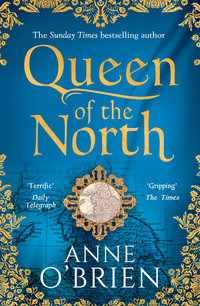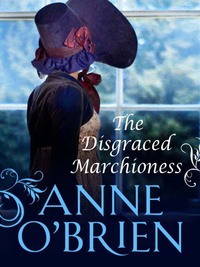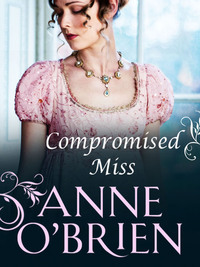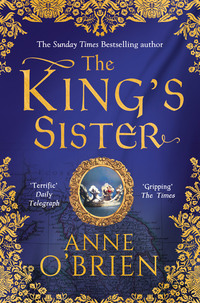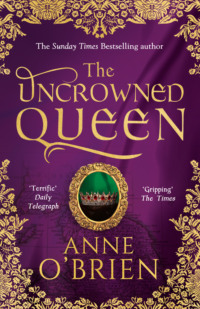
The Queen’s Rival
I could read her hatred of the House of York in every gesture as she swept her skirts and moved to stand beside Henry as if to protect him from unseen danger. ‘Given your freedom, what would prevent you from leaving England and joining the arch traitor? The money for the comfort of your young children must not fall into your husband’s hand to be used against us. I know that you still have powerful friends, powerful families in England who would help you. There are Bourchiers and Nevilles who will flock to your banners if they should ever be raised again. It would be better for all if you remained in England, with no contact of any description with Richard Plantagenet.’
A little rush of panic forced me to stiffen my knees. To have no contact, no letters? I kept my silence as she delivered her sentence.
‘We have agreed that you will be kept under strict surveillance.’
‘Am I to be incarcerated?’
It came as a shock, although I should have expected it. I glanced at Henry who had turned away towards the window, the book held close as if he had difficulty in reading it without a stronger light.
‘The King knows what he needs to know,’ the Queen replied to my unspoken query. ‘I will make the decisions here, and inform my lord if I consider it necessary.’ Marguerite continued in the same soft accents, ‘All has been arranged. You will be sent to live in the custody of your sister, the Duchess of Buckingham. I imagine she will not be persuaded to allow you a free hand in your conspiracies against the crown. Her husband is one of our most loyal supporters.’
I remained calm. ‘Do I have a choice in this, my lady?’
‘None.’
Which was plain enough. Any hope of my aiding Richard’s return was fast dissipating like autumn mist before the rising sun.
‘And how long will it be, that I must I bear my sister company?’
‘Until we are certain of the loyalty of the House of York. It may be until death takes a hand to rob us of our traitors.’ The returning smile on her lips was not a friendly one. ‘It may be a long sojourn if the Duke of York remains alive and in exile. You must bend your mind to it, madam. We have arranged that you will travel there tomorrow.’
‘And my children?’
‘They will stay with you, of course, under your guidance. Have we not offered you mercy with a lavish hand? I would be the last woman to separate a mother from her children of such tender years. You will merely live quietly in retirement until better days.’
So that was what she had planned. As long as I was quiet and biddable and my family remained in powerless exile, I would be punished no further. In that moment I wished that I had fled to join Richard in Ireland.
‘I have arranged your travel in one of my own equipages, madam. All that remains is for me to wish you farewell and a safe journey.’
Her expression held the hardness of granite as, at the last, she offered me her hand to salute, whereupon I responded as Court manners demanded. The Queen had deliberately, acrimoniously, thwarted Henry’s infinite mercy. I was aflame with rage, but at least she could not reach the exiles, wherever they might be.
‘Once,’ I said, releasing her cold fingers, ‘we would have found a better spirit of conciliation. We would not have parted on these terms. I was a friend to you when you were in need.’
‘Now I have no need of your friendship. I do not believe it exists. There will be no conciliation, now or ever. Godspeed to Tonbridge Castle, madam.’
From Anne, Duchess of Buckingham, to Cecily, one-time Duchess of York
Written from Tonbridge Castle
Cecily,
It seems, my sister, that I can no longer address you as Duchess. What a humiliation for you, Cis! You have my sympathy. Marguerite is a vengeful woman, brimful of bile. My advice is not to tread further on her delicate toes.
I am informed that you are to be a long-term guest.
I will give you accommodation because I have been commanded to do so. I expect that you will be bringing your children with you. I trust that they will settle in quietly. I would not want them to disturb the running of the household or to have an adverse influence over my grandsons who are both young enough to be swayed by strong or wayward characters. I remember George being a wilful child, reluctant to accept admonishment. There was the incident of a dead chicken, as I recall, and a broken window on your last visit.
There must be no plotting on behalf of your treacherous husband under my roof.
Do not expect a friendly greeting. You should have known better than to support your husband in his stand against our rightful King.
Your aggrieved sister,
Anne
Cecily Neville to Anne, Duchess of Buckingham
From St Mary’s Priory, Coventry
I am coming to you because I have been ordered to do so and for no other reason. I have been given an escort by the Queen in case I am tempted to flee the country.
My children are always well mannered. They will be no burden on you. I recall nothing about a chicken, dead or alive.
I will be with you soon. I am ordered to travel without heraldic achievements. Nothing to denote my connection to the Duke of York or my own Neville forebears. Anonymity, it seems, is to be the order of the day. I am sure that you will work hard to achieve the same within your household. Have you decided how they will address me? Am I to play the role of a poor relation? My new income will certainly match such a role.
You will be relieved at my anonymity so that your Lancastrian neighbours do not associate your visitors with the traitors of York. It would not do for the Duchess of Buckingham to come under suspicion of conspiring with the enemy, would it?
Your sister,
Cecily
Cecily, Duchess of York, to Elizabeth, Duchess of Suffolk
Written from St Mary’s Priory, Coventry
My dearest daughter,
I write to you with regret. Your connection with your father’s so-called treachery has cost you dear. I am told that your husband John de la Pole has been demoted from Duke to Earl of Suffolk, merely because he is wed to you, even though he has kept clear of the military disturbances of past years. This is not a reproof of his reluctance to declare for York on the battlefield. I know that his heart is with us in our fight to remove the hostile counsellors from Henry’s Court.
You will have to become used to being a Countess rather than a Duchess. It is not too difficult. I am stripped of all titles and must not bemoan the fact.
I will be ensconced in Tonbridge Castle with your Aunt Anne for the foreseeable future. I trust that we will be kept from each other’s throats.
If you could perhaps encourage your husband John to declare for York with fire and sword rather than with mild promises, I would be very grateful. A woman has many skills, in bed and at board. Have I not taught you that, from the days of your childhood? If you are your mother’s daughter, drop wisdom in his ear and get him to do something. I know that he avoids a battle like the plague. Tell him that when York returns to England, and takes his rightful place in government, he will find the opportunity to restore the dukedom to him. There might also be financial remuneration. That might persuade him, if nothing else does! I have never known a man complain so often or so loudly of his poverty as John de la Pole. How do you tolerate it?
Your loving mother,
Cecily
Anne, Duchess of Exeter, to her mother, Cecily, Duchess of York
Written from Dartington, Devon
My dearest mother,
I have heard the news from my husband Exeter who is rejoicing at the defeat of York and Salisbury, and particularly Warwick with whom he enjoys a great enmity. This is in the manner of a warning that Exeter has been granted a commission of array to raise a force to put down my father’s rebellion. He is also smugly delighted to be appointed Constable of your much-loved castle at Fotheringhay.
I can only imagine your fury.
Is there no end to my misery in this marriage? There are some days, when he is at his most disparaging against my family, that I consider the benefit of adding the berries of Atropa Belladonna to his morning bowl of frumenty. They grow profusely in Devon.
I have not yet done so. You would be proud of the depth of patience that I have developed. I despise him, however illustrious his Holland name and forebears.
I pray for you and my father, of course. I am not as self-centred as I might appear.
Your unhappy, but resilient daughter,
Anne
England’s Chronicle, November 1459
Do our readers recall the Love Day, that marvellous celebration of reconciliation, held in London a mere year ago? When all bad blood was put to rest? When the Duke of York and his supporters made reparation for the bloody events at the Battle of St Albans? It was a momentous coup on behalf of King Henry who had visions of a heavenly peace descending on the realm.
It was the procession through the streets to St Paul’s that drew the eye.
King Henry walking alone, urbane and beaming, richly robed and crowned, jewels shining in the sun, led the way.
Behind him – can anyone forget the sight? – two by two, hand in hand, arm in arm, walked the previous foresworn enemies, smiling in complete amity. The most bitter enemies in the land forced to clasp hands in false friendship.
Such pairings! Men who would rather stick a dagger into the other’s ribs.
Somerset and Salisbury.
Exeter and Warwick.
And then, most astonishing of all, the Queen and the Duke of York, stepped formally together, hand in hand, as if in some formal Court dance.
All pomp and glamour. All lies.
Do we readily give credence to the belief that the Duke of York and his Neville allies will accept their banishment, the dread attainder? Do we think that Duchess Cecily will live comfortably without making any attempt to restore her husband to his rightful place in the realm, at King Henry’s side?
We offer you a wager if you are of a mind to take it.
Chapter Five

Nevilles Were Not Born to Surrender
Duchess Cecily settles into her imprisonment in Tonbridge Castle, December 1459
‘Take the boys to the kitchens. Feed them and escort them to their chambers.’ And then to me: ‘You must be fatigued from travel, Cecily. We will talk privately.’
My sister Anne, come to issue orders and welcome me.
Subdued by the journey and the overpowering stonework of the high walls and barbican towers, George and Diccon followed the servant without question, while I assessed our reception. It was a welcome of sorts, I supposed, but an icy one. I should have been grateful that my sister had condescended to appear in her inner bailey for the event, rather than leave it to her Steward.
‘Thank you for your hospitality,’ I said.
Anne’s expression remained unresponsively bleak. She made no move to approach me; I was stiff and weary, hungry and thirsty, but I could afford no weakness, and thus I waited, unmoving, a reluctant guest. There was a vast gulf between us, and no accord.
‘Follow me,’ she commanded.
And so I did, drawing Meg with me, an encouraging smile in her direction.
Tonbridge Castle, a fortress in Kent, was to be my future home. It was not my first visit, but it struck me anew that it was a castle that demanded respect, with a strength as great if not greater than any in England. Had that been in Marguerite’s mind when she sent me here? There would be no escape, no rescue attempt. I was destined to remain at Tonbridge until Marguerite decided otherwise, hemmed in by the great towers at four corners connected by a formidable structure of high curtain walls. A massive keep on a motte where I would be given rooms. A double gatehouse, the walls thick and menacing. Despite the evening glow of the sandstone facings, it did not welcome me. The gates had closed behind me, making it a true imprisonment.
‘Don’t tarry. It grows cold.’ Anne marched ahead of me with her head high and her velvet skirts swishing against the painted tiles.
Thus the chasm between us gleamed as darkly as the approaching night-clouds. Since that terrible day that Richard left me in Ludlow, I had never felt so isolated, not even when I stood alone in the midst of Henry’s lawless troops. Not even when I had knelt before the King. Hiding my sense of hopelessness, I followed Anne into the keep, my head as high as hers, and a sharp glance at Meg to do the same.
My sister escorted me up to her solar where candles had been lit, dismissing her women after ale had been brought. I drank. I needed to quench my thirst but even more I needed the strength from its bitter taste, as Anne deliberately occupied the chair with arms and a carved back. For Meg and I, meagre stools were provided.
‘I should thank you for receiving me,’ I said, to interrupt what was becoming a heavy silence.
‘I was given little choice in the matter.’
‘Yet still it is good to see you.’
‘I find that hard to believe.’
Meg sat silently.
‘Is Humphrey with the King?’ I asked.
‘Of course he is. What would you expect? But then I no longer understand your ambition-driven motives. What does Richard want? The crown for himself? Do you see yourself at his side, wearing a crown?’
I inhaled slowly, taking another sip of ale. ‘He does not. I do not. You know that Richard wishes merely to take his rightful role as Henry’s counsellor.’
‘Why should I believe you?’ Anne’s fingers were tightly woven together in her lap, when they were not picking at the soft nap of the velvet. ‘York raised an army against the King. Our brother Salisbury fought against the King’s forces at Blore Heath and killed his commander. With such a history of rebellion, why should I not believe that you are the most disloyal of subjects?’
I held her stare.
‘I was never a liar.’
‘You could reject him now and regain your freedom. Divorce is possible with support in the right circles.’
‘Give me one good reason why I would not remain shackled to him? His ambitions are mine too. I have no love for Somerset and his friends.’
‘York has treated you wickedly enough. Why would this not drive you back to where you and all Nevilles belong? Back to Lancaster.’
‘What do you mean?’
My weariness had drained away under so personal an attack, against Richard more than against me.
‘Everyone has heard the tale of what happened in Ludlow.’
‘Then you must tell me.’
‘Don’t be naive, Cis.’ The use of my shortened name was not friendly. ‘It has all been repeated delectably in Lancastrian circles – embroidered to make the worst of the Duke of York, I accept, but I would wager there is more than a kernel of truth in it. How he relinquished his wife, abandoning her to face the enemy on her own, allowing her to stand at the market cross, with three small children weeping and clutching at her skirts.’ The long-pent-up bitterness flowed on and on. ‘Oh, I’ll not dispute that the Lancastrian forces behaved like drunken sots, but for York to leave you unprotected, not knowing if they would kill you in drink-fuelled retribution, is too much to tolerate.’
A brief silence fell, as I absorbed the accurate depth of rumour. And how could I put it right?
‘But that is not true.’ My loyal daughter Meg had found her voice under the onslaught. I had my champion after all.
With a ghost of a smile, I put out my hand to Meg’s. ‘Your aunt does not mean to place the blame on your father.’
‘Yes, she does. It is false.’
‘Yes, the tale is false,’ I agreed, holding my daughter’s infuriated gaze. ‘We were not abandoned at the market cross. We were safe in the castle. Except that…’
‘Except what?’ Anne demanded.
‘Except that someone opened the gates,’ I admitted.
‘Is that any better? That some of your own people betrayed you?’
‘Only one disgruntled guard,’ Meg said, astonishing me at her summing up of that terrifying event. Until now she had been reticent; in the face of her aunt’s attack, she was not. ‘No one subjected us to disrespect or lack of care. We did go down into Ludlow, to see what had been done for our people. It was not my father’s fault that the royal troops ruined the town. We stood by our duty to him.’
‘A brave speech indeed.’ Anne’s lips twisted in disbelief, dismissing the whole subject. ‘What cannot be remedied, Cecily, is that there is no longer a future in England for Richard or for your sons. Accept it. Meanwhile you are to live under my jurisdiction. I do not enjoy this, but it is all your own fault.’
Swift anger swept away my determination to be compliant. I stood, drawing Meg with me, conscious that my brave daughter was wan with fatigue. ‘Then since we are here only under sufferance, and to be kept under lock and key, I would be grateful if you would direct me to our chambers. You may then lock the doors after us. Do you release us for meals?’
‘There is no call to be frivolous, Cecily. We must strive to not prey on each other’s patience.’
‘I think you have done quite enough to my patience already.’
When I stood by the door, I turned my head and asked, because I must, for I had still received no firm news of Richard and Edmund, or of Ned and my brother, even after all this time.
‘Have you received news of my family?’
‘Yes. If you mean the traitors. I know of their whereabouts.’
Did she hesitate deliberately? How vicious political conflict could make us. I turned foursquare, her closed expression a fist below my heart, making me dread her news.
‘Will you have me beg for you to tell me? I will kneel at your feet if I must.’
It heightened the colour in her cheeks, I hoped from shame. ‘They are all safe and well.’
‘Where?’
‘Our brother Salisbury, nephew Warwick and Edward in Calais as you would expect. York and Edmund are in Dublin, so I am told.’
I had not realised what a weight this had been on my mind.
‘May the Blessed Virgin be praised.’
‘Since they are traitors, I doubt the Blessed Virgin is particularly pleased. I imagine She would rather they paid dearly for their sins against an anointed King.’
I was not listening. All my senses were trained on that one surge of utter relief. They were safe. They were alive. Better days would surely come when they returned to England. I even felt more kindly towards my sister who had given me this hope, however small a seed it might be, however reluctantly on her part.
‘I advise you not to pray for their return, Cis. The best they can do is to make a life for themselves overseas. If they set foot in England again they will face execution. And you might not come off so lightly if you continue in your loyalty to them.’
‘You were not used to be so critical.’
‘You were not used to be a traitor.’
‘I swear I am not—’
‘I do not wish to speak of it. The conspiracy of my brother, my nephew and your husband is not fit conversation for my home. I forbid you to talk of it. I will never be persuaded that what you did was right.’
Which depressed any sentiment I might have had towards reconciliation.
‘Furthermore,’ Anne continued, ‘you will resign yourself to having no communication with the outside world. You are not to be trusted, thus you will receive neither visitors nor correspondence.’
I inclined my head and awarded my sister the victory of a brief curtsey. ‘I will live here on your terms, because I must. I apologise for the necessity.’
As I walked before her from the room, I thought for a brief moment that I felt the gentle touch of her hand on my shoulder. Turning quickly, I realised I had been mistaken; she was gesturing for Meg to follow.
‘Do we speak with no one?’ Meg asked in weary horror, when the door to our interconnecting chambers was locked.
‘Wait and see,’ was all I could say, but I held her close within the circle of my arm, noting that she had grown almost as tall as I.
I had no intention of being separated from the world of Richard and my sons. My sister would not find me a willing captive, however compliant my outward demeanour.
It was dark now beyond the windows so that I could not see the defences that hemmed us in. It was dark within my soul also.
Cecily, one-time Duchess of York, to her grace the Queen, Marguerite of Anjou
Written from Tonbridge Castle
Your grace,
I have a boon to beg of your endless compassion.
You have seen fit to put me into the custody of my sister who is keen to keep me enclosed and unable to send either help or moneys to my treasonous husband. You will be gratified to know that she is pursuing your orders to the letter. And indeed beyond. My correspondence and my visitors have been strictly curtailed.
The Duchess of Buckingham sees it as her duty to lecture me on my sins, also as you would wish, but is not willing to hear my confession of them. Yet, in my acknowledgement of my lord’s mistake in raising a force against the King, I am in need of a confidante to point my wayward thoughts in the right direction. That is forbidden me in this household.
I write to ask permission to correspond with my sister in Epworth.
I can think of no better recipient of my burden of regret and failure than Katherine, Dowager Duchess of Norfolk. I ask, gracious lady, your permission to do so, since my sister Anne refuses to allow it. Katherine is no traitor. You will agree that her husband John, Viscount Beaumont, is the most loyal of your subjects. He has already proved that he will do nothing to further the House of York, and I know that my sister Katherine is a most obedient wife.
If you, in your mercy, would allow my sister the Duchess of Buckingham to grant her permission for me to correspond, I would be grateful.
Cecily Neville
Anne, Duchess of Buckingham, to Katherine, Dowager Duchess of Norfolk
Written from Tonbridge Castle
Dear Kat,
I am out of all patience.
She has not been here more than a se’enight and she is already engaged in mischief. Our misguided sister Cecily, balking at the restriction put on her, has requested the Queen’s permission to write to you, against my better judgement. She wrote to the Queen behind my back, bribing one of my ostlers, which is certainly in character.
Cecily claims a need to make a confession and receive counsel. Why not confess to my priest? She says that she finds him an intolerant ear. Why would he be tolerant of a woman who came close to being attainted?
I even understand that she signed the letter Cecily Neville, as if she would distance herself from York. I don’t believe it for one moment.
However, with the Queen’s permission, I now cannot prevent her writing to you. I trust you will reply with admirable stiff-necked advice to lower her pretensions. Don’t encourage her in any acts of rebellion. Your husband would certainly not wish it, and neither would I. She sits in her chamber spinning a web like some small malevolent spider, smiling all the while.
It has to be said that she has not changed, despite her recent experiences. No one would think that she had to fend off a violent and carousing mob in Ludlow. I don’t know how much she suffered because not one word of it has crossed her lips, but her will is so strong. If she mourns the loss of York, I see no trace of it. Cecily may be clad as if in mourning in black damask, but her veils are miraculously embroidered, transparent as the finest gauze, supported by fine wires into airy confections. And I covet them. Which is of course a sin.


